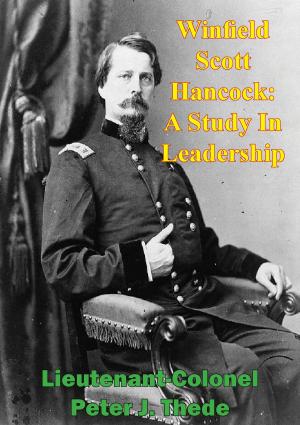Hancock The Superb
Nonfiction, History, Modern, 19th Century, Americas, United States, Civil War Period (1850-1877), Military| Author: | Glenn Tucker | ISBN: | 9781786251312 |
| Publisher: | Golden Springs Publishing | Publication: | November 6, 2015 |
| Imprint: | Golden Springs Publishing | Language: | English |
| Author: | Glenn Tucker |
| ISBN: | 9781786251312 |
| Publisher: | Golden Springs Publishing |
| Publication: | November 6, 2015 |
| Imprint: | Golden Springs Publishing |
| Language: | English |
This is the life story of a great fighting general of the Civil War, Winfield Scott Hancock.
In the early fighting on the Peninsula, when the Confederates were flanked out of Fort Magruder, McClellan reported, “Hancock was superb.” Before long people were referring to him as Hancock the Superb, and for the next three years he re-earned the sobriquet in battle after battle. He was able to distinguish himself equally in disastrous defeat, as at Chancellorsville, and m victory, as at Gettysburg. Tucker feels personally that some of Hancock’s work with Grant—in the Wilderness and at Spotsylvania—was the most fascinating of his career, and he makes a good case for this view.
Glenn Tucker chose to write about Hancock primarily because of his interesting personality and remarkable career. These are reason enough.
He also had another reason. For more than three years, while a succession of commanding generals came and went, Hancock was a growing power in the Army of the Potomac. Along with his study of Hancock, Tucker also presents a graphic picture of the Army of the Potomac.
It was a much maligned army. Because of its inept, bumbling commanders, it took some crushing and much publicized defeats. But in spite of Pope, Burnside, Hooker and others not much better, it weathered the worst blows Lee could inflict on it, preserved a bloody stalemate and at last wore down the enemy.
Hancock and the Army of the Potomac fought together right up to the end. Never seeking top command, Hancock was the best and most trusted of the subordinate generals. Under good commanders and bad, his steadiness, unfailing courage and incisive military judgment many times helped to preserve the Army of the Potomac as an efficient fighting force.
Glenn Tucker’s reporting skill puts you right in the action. You are at Hancock’s elbow in a score of battles in Virginia and you are there for three cataclysmic days at Gettysburg.
This is the life story of a great fighting general of the Civil War, Winfield Scott Hancock.
In the early fighting on the Peninsula, when the Confederates were flanked out of Fort Magruder, McClellan reported, “Hancock was superb.” Before long people were referring to him as Hancock the Superb, and for the next three years he re-earned the sobriquet in battle after battle. He was able to distinguish himself equally in disastrous defeat, as at Chancellorsville, and m victory, as at Gettysburg. Tucker feels personally that some of Hancock’s work with Grant—in the Wilderness and at Spotsylvania—was the most fascinating of his career, and he makes a good case for this view.
Glenn Tucker chose to write about Hancock primarily because of his interesting personality and remarkable career. These are reason enough.
He also had another reason. For more than three years, while a succession of commanding generals came and went, Hancock was a growing power in the Army of the Potomac. Along with his study of Hancock, Tucker also presents a graphic picture of the Army of the Potomac.
It was a much maligned army. Because of its inept, bumbling commanders, it took some crushing and much publicized defeats. But in spite of Pope, Burnside, Hooker and others not much better, it weathered the worst blows Lee could inflict on it, preserved a bloody stalemate and at last wore down the enemy.
Hancock and the Army of the Potomac fought together right up to the end. Never seeking top command, Hancock was the best and most trusted of the subordinate generals. Under good commanders and bad, his steadiness, unfailing courage and incisive military judgment many times helped to preserve the Army of the Potomac as an efficient fighting force.
Glenn Tucker’s reporting skill puts you right in the action. You are at Hancock’s elbow in a score of battles in Virginia and you are there for three cataclysmic days at Gettysburg.

![Cover of the book Four Years With General Lee [Illustrated Edition] by Glenn Tucker](https://www.kuoky.com/images/2014/august/300x300/9781782895336-jH80_300x.jpg)






![Cover of the book Ordeal By Fire: An Informal History Of The Civil War [Illustrated Edition] by Glenn Tucker](https://www.kuoky.com/images/2016/january/300x300/9781786257789-EzyU_300x.jpg)


![Cover of the book When They Burned the White House [Illustrated Edition] by Glenn Tucker](https://www.kuoky.com/images/2016/october/300x300/9781787201934-3qSv_300x.jpg)


![Cover of the book The Battle of Gettysburg [Illustrated Edition] by Glenn Tucker](https://www.kuoky.com/images/2016/july/300x300/9781786259530-fW5O_300x.jpg)
